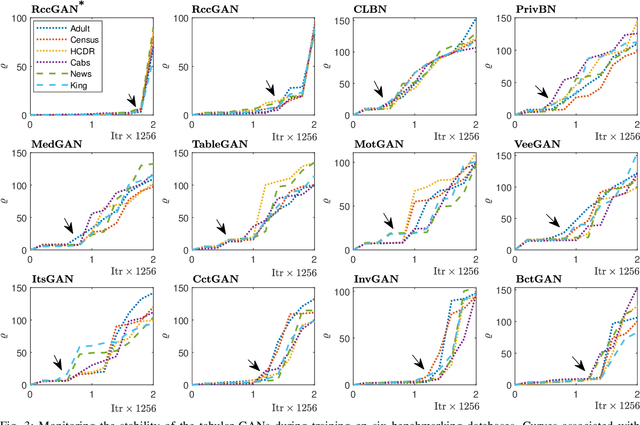Nourhene Chaalia
RSD-GAN: Regularized Sobolev Defense GAN Against Speech-to-Text Adversarial Attacks
Jul 14, 2022
Abstract:This paper introduces a new synthesis-based defense algorithm for counteracting with a varieties of adversarial attacks developed for challenging the performance of the cutting-edge speech-to-text transcription systems. Our algorithm implements a Sobolev-based GAN and proposes a novel regularizer for effectively controlling over the functionality of the entire generative model, particularly the discriminator network during training. Our achieved results upon carrying out numerous experiments on the victim DeepSpeech, Kaldi, and Lingvo speech transcription systems corroborate the remarkable performance of our defense approach against a comprehensive range of targeted and non-targeted adversarial attacks.
RCC-GAN: Regularized Compound Conditional GAN for Large-Scale Tabular Data Synthesis
May 24, 2022



Abstract:This paper introduces a novel generative adversarial network (GAN) for synthesizing large-scale tabular databases which contain various features such as continuous, discrete, and binary. Technically, our GAN belongs to the category of class-conditioned generative models with a predefined conditional vector. However, we propose a new formulation for deriving such a vector incorporating both binary and discrete features simultaneously. We refer to this noble definition as compound conditional vector and employ it for training the generator network. The core architecture of this network is a three-layered deep residual neural network with skip connections. For improving the stability of such complex architecture, we present a regularization scheme towards limiting unprecedented variations on its weight vectors during training. This regularization approach is quite compatible with the nature of adversarial training and it is not computationally prohibitive in runtime. Furthermore, we constantly monitor the variation of the weight vectors for identifying any potential instabilities or irregularities to measure the strength of our proposed regularizer. Toward this end, we also develop a new metric for tracking sudden perturbation on the weight vectors using the singular value decomposition theory. Finally, we evaluate the performance of our proposed synthesis approach on six benchmarking tabular databases, namely Adult, Census, HCDR, Cabs, News, and King. The achieved results corroborate that for the majority of the cases, our proposed RccGAN outperforms other conventional and modern generative models in terms of accuracy, stability, and reliability.
Bi-Discriminator Class-Conditional Tabular GAN
Dec 02, 2021

Abstract:This paper introduces a bi-discriminator GAN for synthesizing tabular datasets containing continuous, binary, and discrete columns. Our proposed approach employs an adapted preprocessing scheme and a novel conditional term for the generator network to more effectively capture the input sample distributions. Additionally, we implement straightforward yet effective architectures for discriminator networks aiming at providing more discriminative gradient information to the generator. Our experimental results on four benchmarking public datasets corroborates the superior performance of our GAN both in terms of likelihood fitness metric and machine learning efficacy.
 Add to Chrome
Add to Chrome Add to Firefox
Add to Firefox Add to Edge
Add to Edge